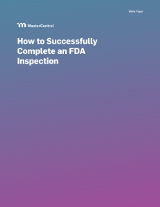
GxP Lifeline
The FDA Just Called! Do You Have an FDA Audit Process in Place?

If the U.S. Food and Drug Administration (FDA) called tomorrow to schedule a visit to your facility, would you panic or would you go on about your day, business as usual, knowing you have a robust FDA audit process in place? FDA audits can be stressful, and failing one can have significant consequences. With proper preparation and a robust FDA audit management plan, however, the call to schedule an FDA inspection doesn’t have to be so unnerving.
Preparing for an FDA inspection, whether it’s routine or for-cause, can be grueling. Following the FDA Quality System Inspection Technique (QSIT), the inspector assesses an organization’s systems, methods, and procedures to ensure a quality management system (QMS) is established and maintained effectively. The FDA inspection process typically involves observing employee activities, interviewing employees, reviewing records, and looking at documented procedures and requirements to assess how they all fit together in the quality system.
Rather than scramble to prepare everything and everyone when the FDA comes calling, it’s better to have a robust FDA audit management plan and to maintain a constant state of readiness before that phone call even occurs.
“The best way to survive an FDA inspection is to always be prepared for it,” according to Linda Chatwin, who heads the Medical Devices Regulatory Services section of UL in North America, who offered some insight into FDA audit process readiness in a webinar with compliance and risk consultant Walt Murray.
Tips to Help Maintain a State of FDA Audit Process Readiness
In the webinar, Chatwin and Murray highlighted three FDA audit management tools that can help organizations maintain a constant state of FDA audit process readiness:
-
Internal audits
It’s important to maintain a robust, well-organized internal audit program and that internal audit results are continuously monitored and reviewed to determine if there are recurring problems or new problems that weren’t addressed during previous audits. Having a history of internal audits also indicates to the FDA that your organization understands quality requirements and takes its quality system seriously.
-
Mock audits
Vigorous mock audits can reveal possible quality system gaps that can then be resolved. “Conducting mock FDA audits is an excellent way to keep in a state of readiness and help employees in the organization understand what it would be like when the real FDA comes and audits [the organization],” according to Chatwin. Done properly, conducting mock audits can boost site staff’s confidence during inspections.
-
External audits
Having some experience with previous external audits (e.g., customer, supplier, FDA), and applying lessons learned from those, can also help. Often, companies already have customers auditing them regularly, which can serve as learning opportunities, and conducting supplier audits can give you some ideas of what to include in your own internal audit program.
As a regular part of an FDA audit management plan, these three types of audits can provide insight into areas where operations can be improved.
Audit Management Software as a Tool in the FDA Audit Process
Documentation is an essential part of regulatory audits and inspections, as organizations must be prepared to show complete, up-to-date documents upon request within a reasonable amount of time. If your organization still relies on paper to manage records and documented procedures and requirements, FDA audit management becomes all the more difficult.
Audit management software that is fully connected with other parts of the QMS can help automate, streamline, and manage the FDA audit process to ensure documentation is accurate, complete, and digitally accessible. Audit management software integrates the different steps – preparation, scheduling, execution, observation collection, verification, and completion – for a more efficient and effective process. By integrating compliance audits with document control, corrective action/preventive action (CAPA), change control, training, and other quality processes, audit management software gives organizations the tools to monitor the entire quality system and ensure a continuous state of FDA audit process readiness.

